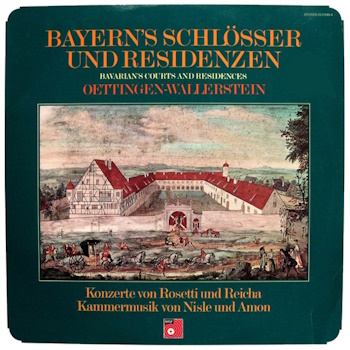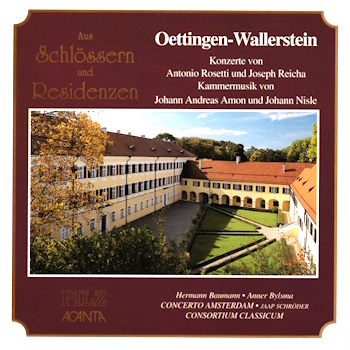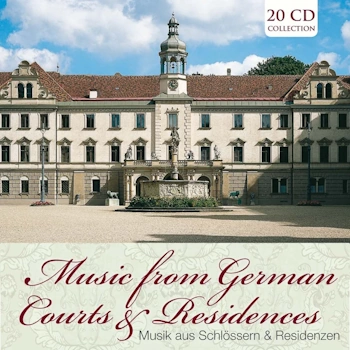 |
|
2 LPs
- 29 21189-4 - (p) 1972
|
 |
| 2 CDs -
44 2175-2 - (c) 1993 |
|
OETTINGEN-WALLERSTEIN
|
|
|
|
|
|
|
|
| Antonio
ROSETTI |
Konzert
F-Dur für Horn und Orchester *
|
LP 1 |
|
13' 46" |
|
| (Franz Anton Rössler,
1750-1792) |
-
Allegro vivace
|
|
6' 06" |
|
A1 |
|
-
Romanze: Adagio |
|
3' 44" |
|
A2 |
|
-
Rondo: Allegro |
|
3' 53" |
|
A3 |
|
(Hermann Baumann:
Horn)
|
|
|
|
|
| Johann Andreas AMON
(1763-1825) |
Quartett
F-Dur für Horn, Violine, Viola und
Violoncello |
LP 1 |
|
11' 38" |
|
|
-
Allegro moderato
|
|
5' 11" |
|
A4 |
|
-
Adagio |
|
3' 21" |
|
A5 |
|
-
Rondo: Allegretto
|
|
3' 26" |
|
A6 |
|
(Hermann Baumann:
Horn | Jaap Schröder: Violine |
Wiel Peeters: Viola | Anner
Bylsma: Violoncello)
|
|
|
|
|
| Joseph REICHA (1746-1795) |
Konzert
G-Dur für Violoncello und
Orchester *
|
LP 1 |
|
24' 10" |
|
|
-
Allegro
|
|
11' 15" |
|
B1 |
|
-
Adagio
|
|
5' 14" |
|
B2 |
|
-
Rondo: Allegretto
|
|
7' 38" |
|
B3 |
|
(Anner Bylsma:
Violoncello)
|
|
|
|
|
| Johann Georg NISLE
(1731-1788) |
Septett
As-Dur für Flöte, Klarinette,
Horn, Fagott, Violine, Viola,
Violoncello und Kontrabaß
|
LP 2 |
|
25' 23" |
|
|
-
Allegro
|
|
8' 09" |
|
C1 |
|
-
Menuett |
|
2' 52" |
|
C2 |
|
-
Adagio |
|
7' 58" |
|
C3 |
|
-
Allegro vivace
|
|
6' 23" |
|
C4 |
|
(Frans Vester:
Flöte | Dieter Klöcker: Klarinette
| Karl-Otto Hartmann: Fagott |
Werner Meyendorf: Horn
Rainer Kussmaul: Violine | Jürgen
Kussmaul: Viola | Anner Bylsma:
Violoncello | Walter Meuter:
Kontrabaß) |
|
|
|
|
| Johann Andreas AMON |
Quartett
D-dur für Flöte, Violine, Viola
und Violoncello, Op. 84
|
LP 2 |
|
20' 02" |
|
|
-
Allegro assai
|
|
8' 27" |
|
D1 |
|
-
Poco adagio
|
|
6' 13" |
|
D2 |
|
-
Rondo: Allegretto
|
|
5' 22" |
|
D3 |
|
(Frans Vester:
Flöte | Rainer Kussmaul: Violine |
Jürgen Kussmaul: Viola | Anner
Bylsma: Violoncello) |
|
|
|
|
|
|
|
|
| COSORTIUM CLASSICUM |
CONCERTO AMSTERDAM *
|
|
|
Jaap SCHRÖDER,
Leitung
|
|
|
|
|
|
Recorded
at: |
|
-
|
|
|
Live / Studio
|
|
Studio |
|
|
Producer |
|
-
|
|
|
Balance engineer
|
|
-
|
|
|
First LP Edition
|
|
BASF
| 29 21189-6 | 2 LPs | durata
49' 34" - 45' 25" | (p)
1972
|
|
|
First CD Edition |
|
PILZ
- ACANTA | 44 2175-2 | 2 CDs |
durata 37' 56" - 57' 03" | (c)
1993 | ADD
|
|
|
Note |
|
-
|
|
|
|
|
Musik
aus Schlössernb &
Residenzen
(20 CD Collection)

Membran |
234355 | (c) 2016
(in CD 5
& 6)
|
The
Ries is a flat, fertile basin of
volcanic origin lying between
the Swabian and Franconian
hills. Here, not far from
Nördlingen, the Counts of
Oettingen-Wallerstein had their
residence. The family had lived
in the district since the middle
of the 16th century and their
magnificent residence appears
quite early in the annals of
musical history. It was during
the time of Count Kraft Ernst,
however, that music at the
Wallerstein Court really began
to flourish. Kraft Ernst, soon
to be made a Reichsprinz by the
Emperor, on succeeding his
father in 1773, immediately
instituted a court chamber
orchestra, engaging several
excellent musicians, many of
them Bohemian. In less than ten
years the Prince had a fine
orchestra of 11 violonists, 2
oboists, 2 flautists, 2 horn
players, 1 bassoonist, 1 viola
player, 1 cellist and 1
double-bass player. The
Wallerstein court musicians were
acclaimed by the writer
Christian Friedrich Daniel
Schubart, an observant
chronicler of the period
particularly in respect of its
music, who admired their ability
to produce „the most subtle and
practically imperceptible
gradations of tone“. No less an
authority than Joseph Haydn
himself affirmed that the
Wallerstein Court Orchestra
performed his symphonies with
greater precision than any other
orchestra he knew.
The music collection in the
Royal Harburg Library records
that the Wallerstein court
played works by masters of the
Vienna and Mannheim Schools. The
court made a point of keeping in
constant touch with the
international world of music, as
the visits of both Mozart and
Haydn to Wallerstein clearly
show. The repertoire, however,
included a large number of works
by resident musicians as well,
the first one of note being
Ignaz Franz von Beecke, a friend
of Gluck’s and well versed in
the current musical trends in
Paris and Mannheim.
Franz Anton Rößler was in the
service of the
Oettingen-Wallerstein court for
many years, as a double-bass
player and as conductor of the
orchestra. Like many of his
contemporaries he italianized
his name, being known as Antonio
Rosetti. Rößler was born in 1750
in Northern Bohemia (near
Leitmeritz). Much against his
personal inclinations he was
forced to enter Holy Orders, but
eventually obtained a
dispensation in order to devote
himself entirely to music. In
1773 we find his name mentioned
for the first time listed in the
Wallerstein accounts. In 1789 he
left the Wallerstein court to
take up a more lucrative post at
the court of the Duke of
Mecklenburg-Schwerin (in his
last few years at Wallerstein he
had been getting more and more
heavily into debt). Schubart
spoke of him as „one of the most
popular composers“ of his day.
Rößler’s Horn Concerto in F
major, recorded here, was
written during his time at
Wallerstein.
Joseph Reicha (uncle of the
composer Antonin Reicha, the
teacher friend of Beethoven) was
born in 1746 at Klattau
(Klatovy), South West Bohemia.
He was a violoncellist of
considerable distinction. For 11
years, from 1774 to 1785, he was
in the service of the
Oettingen-Wallerstein court,
after which he obtained a post
at the court of the Elector of
Cologne. In 1789 he was
appointed conductor of the new
Electoral National Theatre
Orchestra in Bonn, the orchestra
in which from time to time the
young Beethoven played the
viola.
Johann Georg Nisle, born at
Geislingen (Württemberg) in
1731, was for several years
hautboist in the Württemberg
Ducal Guard at Ludwigsburg. In
1773 he entered the service of
Prince Kraft Ernst at
Oettingen-Wallerstein as a horn
player and from 1777 until his
death in 1788 held posts at the
courts of Neuwied,
Hildburghausen and Meiningen.
Accompanied by his gifted sons,
whom he set up as child
prodigies, Nisle toured
extensively, securing for
himself a wide reputation as a
horn virtuoso of phenomenal
skill.
Shortly after the death of
Prince Kraft Ernst the
principality of
Oettingen-Wallerstein was
annexed to the Kingdom of
Bavaria.
A year later, in 1807, the court
orchestra had to be disbanded
(the entire staff „with the
exception of liveried servants“
was dismissed). It was not until
1812, when Prince Ludwig Kraft
was able to take over the
government, that court musical
activities could be organised
again. A court orchestra was
re-formed, and in 1818 the
distinguished musician Johann
Andreas Amon was acquired as
director. Once more music began
to flourish at Wallerstein.
Johann Andreas Amon, born in
Bamberg in 1763, was a pupil of
the famous horn virtuoso Johann
Wenzel Stich (alias Giovanni
Punto), a friend of Beethoven’s.
An accomplished horn player
himself, he undertook extensive
concert tours, his travels
taking him to Paris, where he
studied composition with the
successful opera composer,
Antonio Salieri. He became a
personal friend of both Haydn
and Mozart. In 1789 he was
appointed Municipal Director of
Music at Heilbronn and in 1817
he entered the service of Prince
Ludwig Kraft at
Oettingen-Wallerstein, initially
as director of the choir school.
Amon composed works of all
categories, one composition
worth particular mention being a
German Mass, which was a setting
of words by Prince Ludwig Kraft.
Hans-Christoph
Worbs
|
|